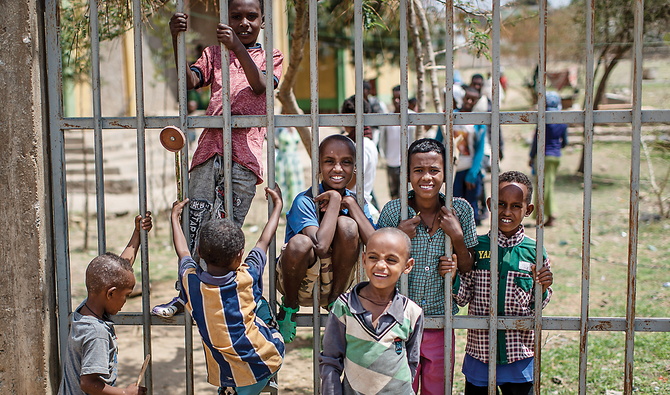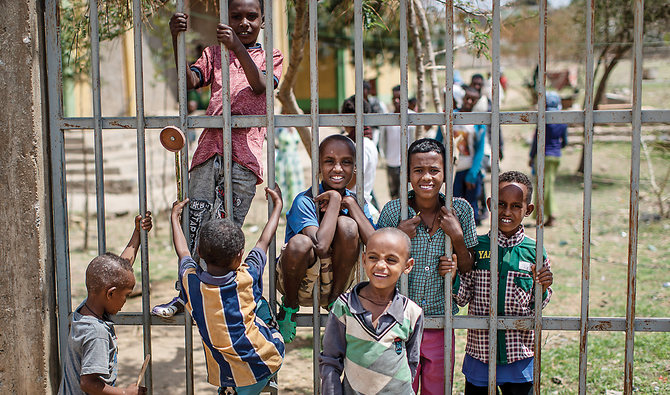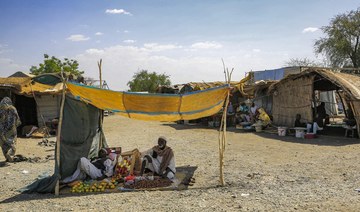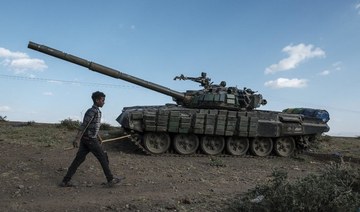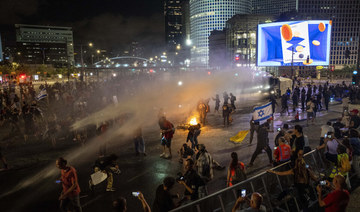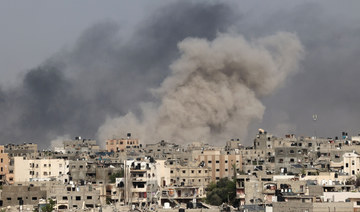ADDIS ABABA: Ethiopia’s army said that a large group of fighters, allegedly members of the former ruling party of the conflict-torn Tigray region, had been “destroyed” attempting to enter the country from neighboring Sudan.
Brig. Gen. Tesfaye Ayalew told the state-affiliated Fana Broadcasting Corporate on Friday that a force of some 320 had tried to enter Ethiopia via the town of Humera in northern Tigray.
“Some of them perished by thirst on the road, a portion was captured, and those who refused to surrender were destroyed by the army,” he said.
Tigray was plunged into conflict in November last year when Prime Minister Abiy Ahmed, winner of the 2019 Nobel Peace Prize, sent troops to oust the Tigray People’s Liberation Front (TPLF), which dominated the country’s politics for decades.
While he promised a brief military campaign, fighting continues with no end in sight, with evidence of massacres, brutal sexual violence and fears of humanitarian catastrophe.
Tens of thousands of refugees have fled into Sudan, with whom Ethiopia is locked in multiple disputes over a contentious border zone, and the construction of a massive hydroelectric project on the Blue Nile.
Ayalew, referring to the force as the “junta,” which is how the Ethiopian government refers to the TPLF, said it was led by “US-based former Ethiopia defense forces officers who turned traitors and another group based in Khartoum.”
He alleged a military agreement “reveals the junta has been working secretly together with a few Sudanese leaders and army officers as well as Ethiopia’s enemies.”
He described the destruction of the force, details of which could not be independently confirmed by AFP, as “a big victory, for our army and our country.”
AFP has reached out to the Sudanese government, which was not immediately available for comment. Khartoum has previously denied accusations it is helping forces in Tigray.
“We are deeply concerned about increasing political and ethnic polarization throughout the country,” the State Department said Friday.
Ethiopia has again delayed its national election after some opposition parties said they would not take part and as conflict in
the Tigray region means no vote is being held there, further complicating the prime minister’s efforts to centralize power.
The head of the national elections board, Birtukan Mideksa, in a meeting with political parties’ representatives on Saturday said the June 5 vote in Africa’s second most populous country would be postponed until a yet-unknown date, citing the need to finish printing ballots, training staffers and compiling voters’ information.
The election board has said some 36.2 million people have registered to vote. It was hoped that up to 50 million would do so.
Ethiopia last year delayed the vote, the first major electoral test for Abiy, citing the COVID-19 pandemic. That heightened tensions with the Tigray region’s leaders, who declared that the prime minister’s mandate had ended and defiantly held a regional vote of their own that Ethiopia called illegal.
The prime minister, who introduced sweeping political reforms after taking office in 2018 and won the Nobel Peace Prize the following year, has repeatedly vowed that this election would be free and fair. Abiy will keep his post if his Prosperity Party wins a majority of seats in the national assembly.
But questions about the vote have been growing.
The campaign director for one of Ethiopia’s largest opposition parties, Yilkal Getnet with the Hibir Ethiopia Democratic Party, said his party has long believed the country is not ready to hold an election at this time.
“There are lots of peace and security challenges across the country in addition to the border issue with Sudan,” Yilkal said, adding that the safety of millions is in question.
“As opposed to the ruling party’s thinking, we don’t believe that the election will solve these problems. A national dialogue on a range of issues should come first.”


